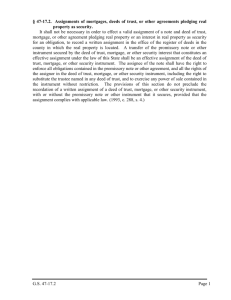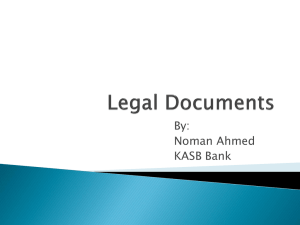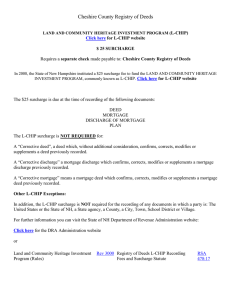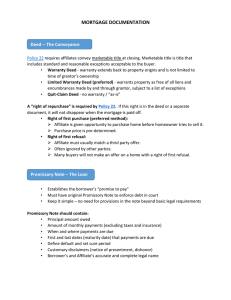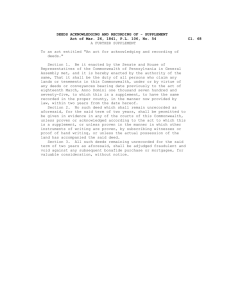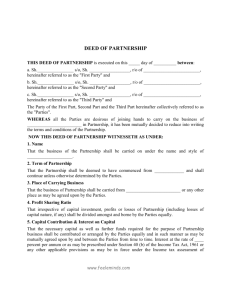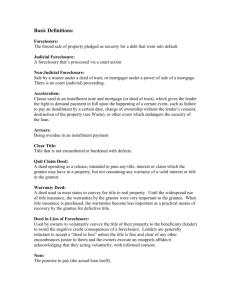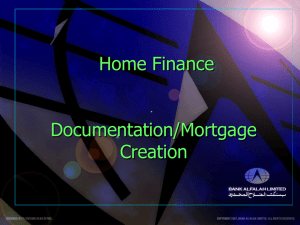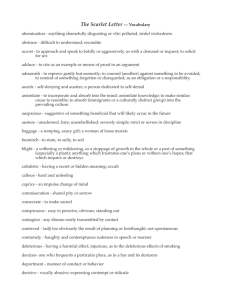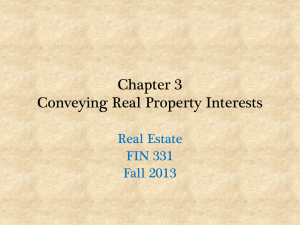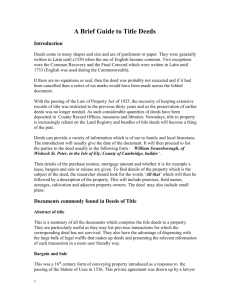to presentation - IFMR Finance Foundation
advertisement
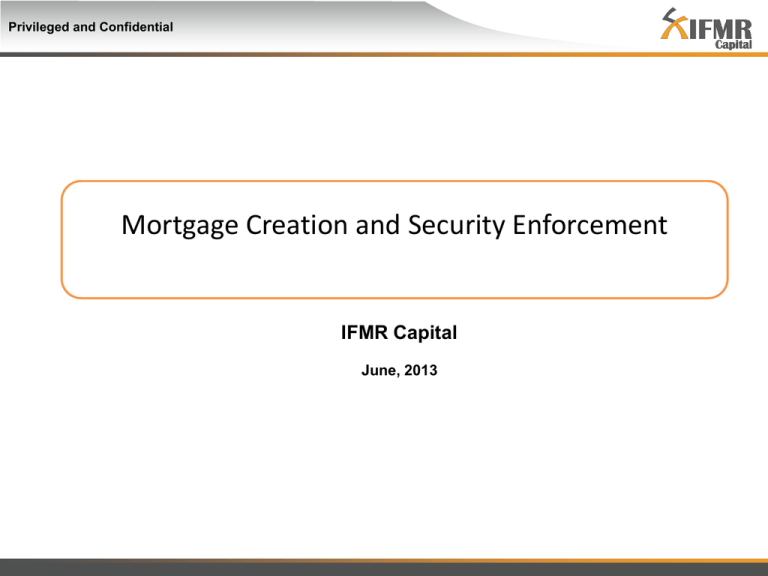
Privileged and Confidential Mortgage Creation and Security Enforcement IFMR Capital June, 2013 Relevance of Security Creation • Secured loans v. Unsecured loans • Focus is on debt recovery options in cases where borrower is unwilling to repay • Standardised documentation and effective security creation for easy enforcement Types of Security Movable Property • Hypothecation • Eg: Vehicles, stock and machinery • Pledge • Eg: gold, shares • Charge • Eg: fixed or floating charge over current assets Immovable Property • Registered simple mortgage • Equitable mortgage by deposit of title deeds Relevant Documents Classification of property Ownership • Freehold • Leasehold • Private/Govt agency • Government land • Nature of property • Residential • Commercial • Agricultural Conversion certificate required to change agricultural land to residential/commercial property Relevant Documents • Title Deeds (sale deed, partition deed, gift deed, settlement deed, etc.) • Parent Documents (tracing chain of prior title deed) • Patta, Chitta, Adangal, A-register extract, EC • Revenue records • Agreement to sell, security documents • Legal title search report is normally taken for the last 13-30 years to verify chain of prior title deeds Relevant Documents Additional requirements for: • Leasehold properties – Permission of lessor for sale, mortgage creation – Conditions of lease to be reviewed and complied with – Allotment letter, possession letter and conveyance deed • Builder properties – Construction agreement – Tripartite agreement Valid execution of documents • Deed v. Contract • Witnessing and notorisation • State specific stamp duty and registration charges • Equitable mortgage – deposit of title deeds, confirmation letter, MODT to be registered in some states • Power of Attorney Enforcement of Security Unsecured Loans Secured Loans • • • • Summary Suit Post-dated / Blank cheques Arbitration Lok Adalats • Debt Recovery Tribunal • SARFAESI Act • Lok Adalats SARFAESI • The Securitisation and Reconstruction of Financial Assets and Enforcement of Security Interest Act, 2002 • Permits banks and Financial Institutions to directly take possession of secured assets • This can be done 60 days after providing a notice for discharge of liabilities • Only involves costs associated directly with recovery and no additional legal costs • The remedy is not available to most NBFCs unless notified by the Central Government Post Dated/Blank Cheques Criminal liability can be imposed for dishonor of a cheque that has been issued to discharge a subsisting debt or liability under Section 138 of the Negotiable Instruments Act Cheque is dishonored and returned upon presentation at the Bank Within 30 days of dishonor, a demand notice is sent to the Issuer seeking payment of the amount If the amount is not paid within 15 days of Demand Notice, a criminal complaint can be filed within one month subsequent to this period Post Dated/Blank Cheques • A legal presumption exists that the cheque was validly issued for a subsisting debt or liability • The case is mandated to be completed within 6 months as far as feasible • Being a criminal case repayment is not directly ensured under this option, but often acts as an effective deterrent • It is advisable to obtain a written undertaking from the issuer authorizing the lender to fill up details in the signed cheque to effect payment that is due • Cheque should not have been issued merely as a security prior to the loan disbursement • Scalability is an issue with this option • Default on ECS also follow similar procedure Arbitration • Arbitration clause to be included in the agreement • A third party unbiased arbitrator will decide the case based on the claims and evidence presented before it • More informal and does not require adherence to procedural laws, making it a simpler and faster process • Costs of arbitration are typically high and disproportionate to the benefits if the claim amounts are small • Arbitral award is final and automatically enforceable after 3 months. • Dissatisfied parties often seek to set aside the award on grounds of procedural irregularities and public policy Thank You
